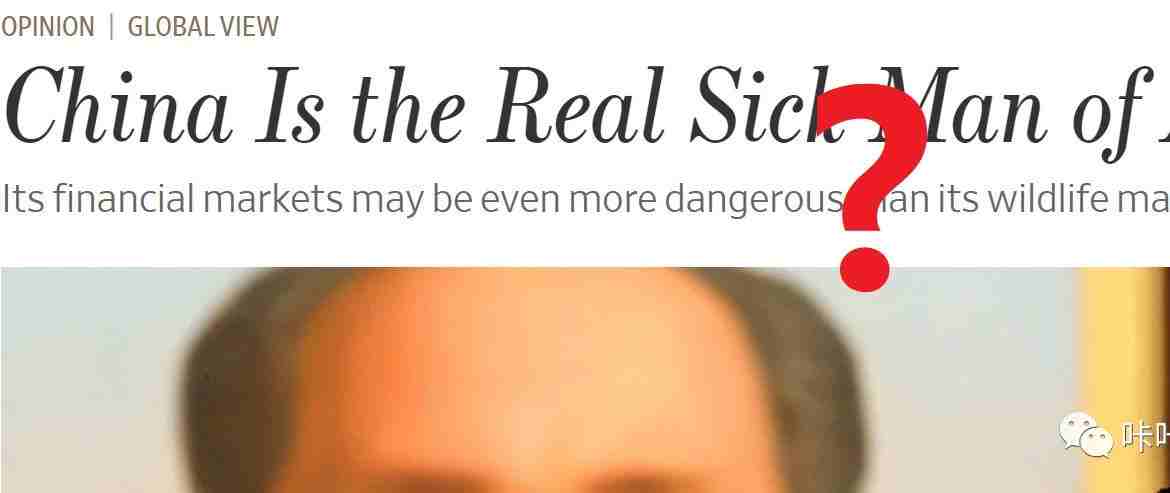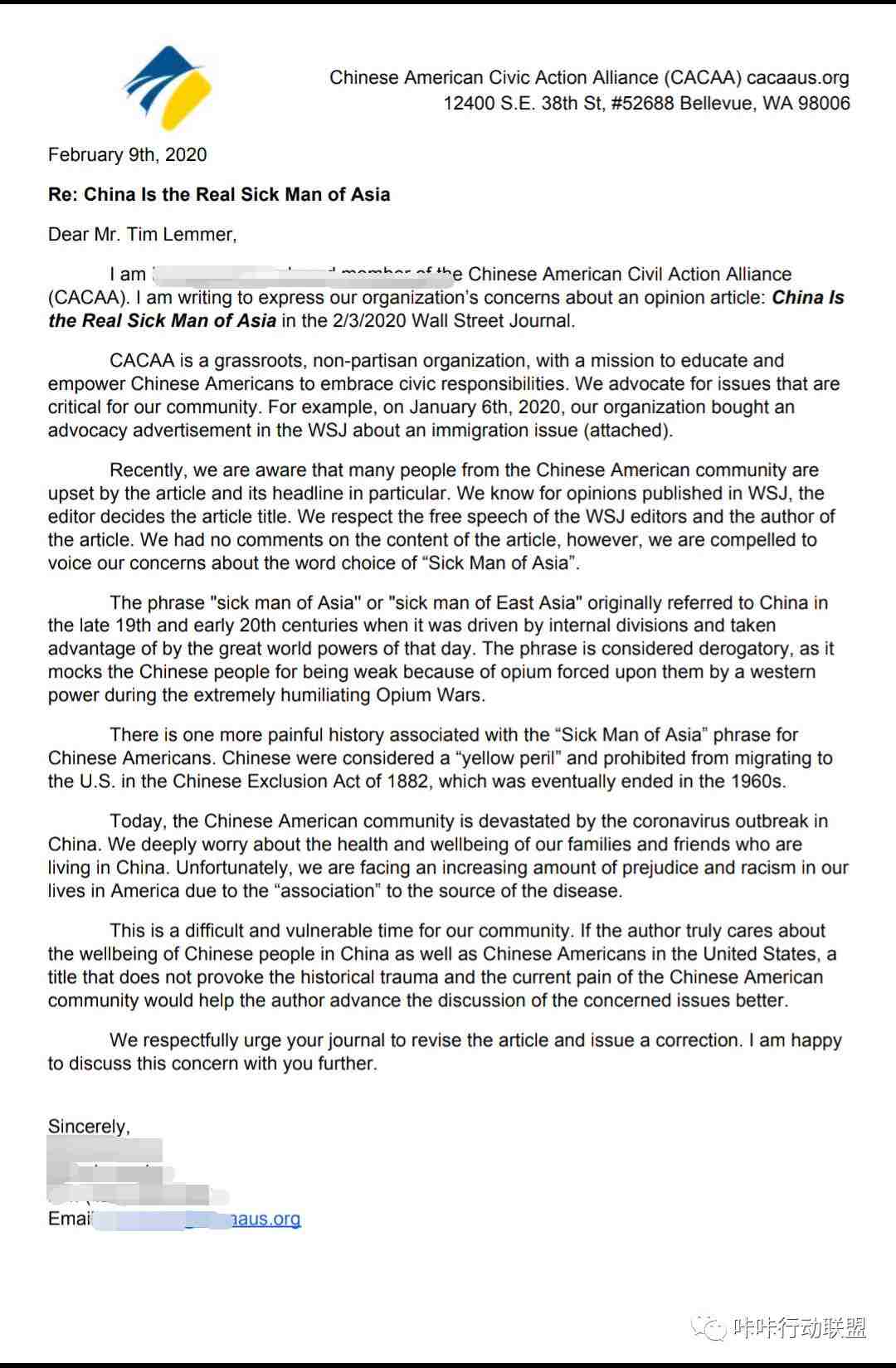咔咔致信WSJ,要求修改“亚洲病夫”一文题目

大疫当前,华尔街日报于2月3日发表了题为 China Is the Real Sick Man of Asia 的评论文章(原文链接 https://www.wsj.com/articles/china-is-the-real-sick-man-of-asia-11580773677)。报社和作者的言论自由固然值得尊重,然而“亚洲/东亚病夫”一词带有屈辱性历史。并且美国华人因为疫情被厌恶和歧视的情况最近屡屡发生。这种文章题目是给我们社区的困境雪上加霜,深深地伤害了我们的感情。
有人曾致信作者表达不满,但作者表示文章标题由编辑选定,自已在文章发布前看不到标题。从目前看,编辑已经了解此事但是并没有公开回应。

文章作者邮件回应(图片来自网络, 版权归原作者)
作为华人组织以及华尔街日报客户 (1月6号反S386广告,花了3万美元,详见推特:https://twitter.com/cacaa_anti_s386/status/1214222773918294021),咔咔已向WSJ编辑发送正式邮件教育“亚洲病夫”一词对华人社区的伤害,并批评这种在敏感时刻消费苦难,吸引流量的标题党的行为。并要求编辑修改题目。
我们在此给大家分享这封公开信,并呼吁大家在美国要一直有为自己发声的意识,有理有据地打电话,发邮件,见议员,不要情绪用事。我们要不断练习为华人争取话语权。亚裔不会只是”哑裔”。

咔咔给WSJ编辑的邮件原文
美国的媒体不是铁板一块。也有很多为积极作为,献计献策的美国媒体、组织和个人,为武汉疫情奔走。小编们最近一边设计下一期的反S.386广告,一边翻看报纸寻找灵感。我们发现为武汉加油的文章很多很多。WSJ这种标题党是小众。
另外,我们有看见不少人宣传白宫请愿。白宫请愿没有用,因为政府不能去限制媒体的言论。
最后,S.386还没有死呢,它精神着呢。这里呼唤小伙伴们回来继续反S.386。
附信件文字版:
Dear Mr. Tim Lemmer,
This is Chinese American Civil Action Alliance (CACAA). I am writing to express our organization’s concerns about an opinion article: China Is the Real Sick Man of Asia in the 2/3/2020 Wall Street Journal.
CACAA is a grassroots, non-partisan organization, with a mission to educate and empower Chinese Americans to embrace civic responsibilities. We advocate for issues that are critical for our community. For example, on January 6th, 2020, our organization bought an advocacy advertisement in the WSJ about an immigration issue (attached).
Recently, we are aware that many people from the Chinese American community are upset by the article and its headline in particular. We know for opinions published in WSJ, the editor decides the article title. We respect the free speech of the WSJ editors and the author of the article. We had no comments on the content of the article, however, we are compelled to voice our concerns about the word choice of “Sick Man of Asia”.
The phrase "sick man of Asia'' or "sick man of East Asia" originally referred to China in the late 19th and early 20th centuries when it was driven by internal divisions and taken advantage of by the great world powers of that day. The phrase is considered derogatory, as it mocks the Chinese people for being weak because of opium forced upon them by a western power during the extremely humiliating Opium Wars.
There is one more painful history associated with the “Sick Man of Asia” phrase for Chinese Americans. Chinese were considered a “yellow peril” and prohibited from migrating to the U.S. in the Chinese Exclusion Act of 1882, which was eventually ended in the 1960s.
Today, the Chinese American community is devastated by the coronavirus outbreak in China. We deeply worry about the health and wellbeing of our families and friends who are living in China. Unfortunately, we are facing an increasing amount of prejudice and racism in our lives in America due to the “association” to the source of the disease.
This is a difficult and vulnerable time for our community. If the author truly cares about the wellbeing of Chinese people in China as well as Chinese Americans in the United States, a title that does not provoke the historical trauma and the current pain of the Chinese American community would help the author advance the discussion of the concerned issues better.
We respectfully urge your journal to revise the article and issue a correction. I am happy to discuss this concern with you further.
Sincerely,
Chinese American Civic Action Alliance
【关于咔咔行动联盟】
咔咔行动联盟(CACAAus.org)是从一系列华人维权和公共事务活动中成长起来的组织。咔咔成员致力于促进华人参政,不分左右。咔咔坚持草根参政理念:民意大过天,天助自助者。

关注咔咔行动联盟

关注陌上美国

加入我们
cacaaus.org/s386/join-us/
(复制链接到浏览器)
最新评论
推荐文章
作者最新文章
你可能感兴趣的文章
Copyright Disclaimer: The copyright of contents (including texts, images, videos and audios) posted above belong to the User who shared or the third-party website which the User shared from. If you found your copyright have been infringed, please send a DMCA takedown notice to [email protected]. For more detail of the source, please click on the button "Read Original Post" below. For other communications, please send to [email protected].
版权声明:以上内容为用户推荐收藏至CareerEngine平台,其内容(含文字、图片、视频、音频等)及知识版权均属用户或用户转发自的第三方网站,如涉嫌侵权,请通知[email protected]进行信息删除。如需查看信息来源,请点击“查看原文”。如需洽谈其它事宜,请联系[email protected]。
版权声明:以上内容为用户推荐收藏至CareerEngine平台,其内容(含文字、图片、视频、音频等)及知识版权均属用户或用户转发自的第三方网站,如涉嫌侵权,请通知[email protected]进行信息删除。如需查看信息来源,请点击“查看原文”。如需洽谈其它事宜,请联系[email protected]。